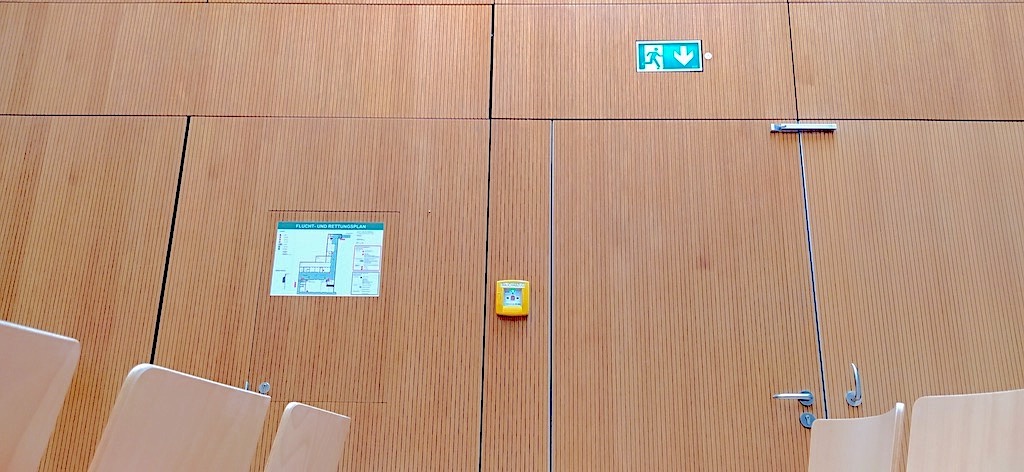Dark Mode
Original article on the X-platform by Martin D. for Sun24 News / September 13, 2024
Another Wirecard day yesterday in freezing cold Munich; Stadelheim courtroom.


As I arrived after the lunch break around 2 pm, I didn't catch another morning questioning of the former Wirecard chief accountant of Erffa by the judge.
But the questioning by the two public prosecutors began shortly after my arrival with a scandal.
But the questioning by the two public prosecutors began shortly after my arrival with a scandal.
Von Erffa was accused by one of the two prosecutors of having "conversed with witnesses to the proceedings", and the relevant laws were read out to von Erffa.
The Wirecard judge briefly interrupted the proceedings and said that "it would be examined whether a detention review was necessary".
The Wirecard judge briefly interrupted the proceedings and said that "it would be examined whether a detention review was necessary".
The prosecutor pointed out that von Erffa had been talking to a listener who was often present in the corridor during the break the day before. This listener was named by the judge on the first day of the trial; in December 2022, the panel was asked whether this listener and Wirecard expert should be named as a witness and questioned; everyone answered in the negative.
After several objections from the defense, the public prosecutor stated that this listener was writing documents to the court and should therefore now be declared a witness; von Erffa was further questioned as to whether he was in contact with "the Wirecard circle", which caused a lack of understanding.
After this scandal, questions from the public prosecutor continued.
First of all, a number of matters relating to payment instructions were investigated. Von Erffa repeatedly stated that he had not ordered any payments. As far as liquidity matters were concerned, he was also not responsible for this, but the treasury department, in this case Ms. Görres, for example.
First of all, a number of matters relating to payment instructions were investigated. Von Erffa repeatedly stated that he had not ordered any payments. As far as liquidity matters were concerned, he was also not responsible for this, but the treasury department, in this case Ms. Görres, for example.
The Wirecard public prosecutor raised several email conversations in which he now wanted to prove that the chief accountant was involved in payment decisions, framework agreements, liquidity checks and more because of CCs and forwarding to von Erffa.
Von Erffa usually explained quite credibly and quite plausibly that he was very often put on distribution lists so that the accounting department was "also informed".
Von Erffa usually explained quite credibly and quite plausibly that he was very often put on distribution lists so that the accounting department was "also informed".
For some of the direct email inquiries to von Erffa, which the Wirecard prosecutor considered inappropriate, the chief accountant explained in a largely understandable, open and mostly plausible manner why he had been contacted in each case.
The following questions concerned Wirecard ad hoc payments, cash pooling, framework agreements, liquidity planning, monitoring, loan agreements, loan agreements - here in particular from Ruprecht and WUKI -, introducer agreements, balance confirmations, and more.
The public prosecutor also asked von Erffa how many trust accounts he thought there had been, to which von Erffa replied 5. The public prosecutor said that he had counted a total of 8, of which these accounts had been misused in the oCap allocation of 100 million euros.
Von Erffa explained here in detail that there were a number of lawyers at Wirecard who also released these things beforehand after checking them, that the auditors always kept an eye on them and that he did not look at every account number for the payments, as fraud was generally not assumed at the time.
Von Erffa explained here in detail that there were a number of lawyers at Wirecard who also released these things beforehand after checking them, that the auditors always kept an eye on them and that he did not look at every account number for the payments, as fraud was generally not assumed at the time.
At one point, the former chief accountant stated after being approached by the prosecutor and judge, quote:
"I am trying to contribute to the clarification here to the best of my knowledge and belief. This after a total of 15 years at Wirecard, where things crossed my desk every second or minute. I could also keep saying 'I don't remember'. I try to answer questions constructively. For example, if you ask if I had anything to do with Hermes (EMIF deal) and I said nothing, this logically referred to the purchase deal, which I had nothing to do with. Later, of course, when Hermes was part of the Wirecard corporate construct, accounting matters relating to it logically crossed my desk. Ultimately, I can never completely rule out the possibility that there was no contact at some point. Otherwise, you can also decide what I should answer."
"I am trying to contribute to the clarification here to the best of my knowledge and belief. This after a total of 15 years at Wirecard, where things crossed my desk every second or minute. I could also keep saying 'I don't remember'. I try to answer questions constructively. For example, if you ask if I had anything to do with Hermes (EMIF deal) and I said nothing, this logically referred to the purchase deal, which I had nothing to do with. Later, of course, when Hermes was part of the Wirecard corporate construct, accounting matters relating to it logically crossed my desk. Ultimately, I can never completely rule out the possibility that there was no contact at some point. Otherwise, you can also decide what I should answer."
The hearing ended at around 16:30. The Wirecard judge asked von Erffa's defense lawyers to remain in the courtroom.
Leave a comment:
Send
Send
Recommended:


























